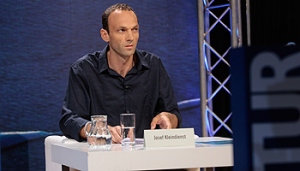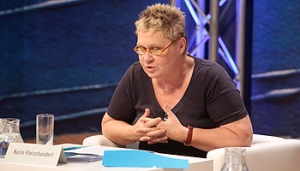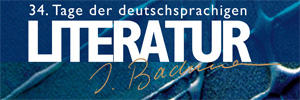 Josef Kleindienst (Bild: Johannes Puch)
Josef Kleindienst (Bild: Johannes Puch)
Josef Kleindienst (A)
Josef Kleindienst from Austria was the last author to read to the jury and the audience on the second day of readings. His text, “Ausgehen” [going out], fell into an abyss, so to speak, because of the suspicion of pornography.
Author portrait
Reading
Discussion
Although Karin Fleischanderl, who invited the author from Carinthia, tried her best to defend him against her colleagues, her attempts were in vain. About the content: the fact that a girl owes a “friend” 20 euros is enough for him to force her into prostitution.
“A brutal text about a brutal act”
Pornography with violence or literature was the question that the jury had to deal with at the end of this day of readings. Alain Claude Sulzer did see some positive things in the text and thought it had a “well-balanced auctorial narrator”. “A brutal text about a brutal act – and as such it is perfect”, Sulzer said.
However, he also asked himself the question about the degree to which this text is “voyeuristic” without having expected a “moral text”.
 Josef Kleindienst (Bild: Johannes Puch)
Josef Kleindienst (Bild: Johannes Puch)
“Reader is pushed into the role of a voyeur”
The perpetrator/victim constellation was portrayed “overly clearly”, said Hildegard Elisabeth Keller, without wishing to say more about it. Rather, she asked herself the question how a text should be designed without the reader being pushed into the position of a voyeur. “In other words: how does the text and thus also its author evade the suspicion of pornography?” The reader is being “fully confronted” with the immediacy of the plot, but really it should contain some “breaks” and “omissions“, “a bit of time out” in order to allow the reader a “certain degree of empathy”. The only skillful part of the text is the break in the chronology at the start. A technique that usually serves to create more tension but doesn’t manage to “save” the text from the suspicion of pornography.
Fleischanderl: “Direct and rough language”
Karin Fleischanderl felt she had to interfere here: although she would have liked the text to have “fewer adjectives”, nonetheless this text moves “directly and with rough language towards its subject matter – a great blessing”, said Fleischanderl, precisely because the text is able to create “great anxiety”. The “breaks” demanded by Keller would shatter this effect with a “more pleasant mood”, with “forgiveness“.
Spinnen: “Protocol of horror” succeeded
“It is extremely difficult and complex”, Burkhard Spinnen believes, to convey “mute violence” using language. He thinks that parts of the text, especially where it turns into a “protocol of horror”, are “very successful”. In the end, he repeatedly asked himself the question: “What more do I now know about mute violence than I did before?” – adding that he has not arrived at an “exhaustive answer”.
 Burkhard Spinnen (Bild: Johannes Puch)
Burkhard Spinnen (Bild: Johannes Puch)
“Why does the text have to explain something?”
“Why does this text, unlike other texts about unwanted pregnancy, have to explain something? It represents, that’s enough!”, was Karin Fleischanderl’s objection.
Feßmann: “A dilettante text"
But Meike Feßmann also thought: “I primarily consider this text to be dilettante.” Presumably, the author tried to show that rural boredom can generate violence. This is traced here “letter by letter”, but the text completely lacks an attitude, a narrative perspective.
“The text remains stuck in its protocol situation”, says Feßmann, which has its origins not in the author’s appreciation of art, but in his inaptitude.
Winkels: “Not successful in many places”
“This should not be assessed this way”, said Hubert Winkels, who made a cinematic connection. Nonetheless, the text is “not successful in many places”. The text “deserves credit”, however, for the fact that it does not assume a moral position and does not create an unambiguous victim. This becomes apparent when the first victim of male violence, Silke, as soon as she has the opportunity, also follows the same power strategies.
 Karin Fleischanderl (Bild: Johannes Puch)
Karin Fleischanderl (Bild: Johannes Puch)
Jandl: “Language is the accomplice of violence”
“This is told in an entirely conventional and basically uninteresting way”, according to Paul Jandl, who also seriously reproached the text – and perhaps also its author: he went as far as maintaining that the language of the text becomes an “accomplice of violence”. “More violence, or less violence – the text wouldn’t change”, Jandl believes, because the events are not relativised by the language.
“An excerpt of violence possibilities, which you almost feel indifferent to, as paradoxical as this may sound.”
“Anxiety does you good”
Karin Fleischanderl made a final attempt at rescuing the text, which did not, however, change her colleagues’ opinion: “I don’t feel indifferent to the text, precisely because it is so unpleasant. Next to complaisance, conventionality and wholesome images, anxiety does you good” – but the others still maintained: “it doesn’t quite add up” (Hubert Winkels).
 TDDl 2010
TDDl 2010